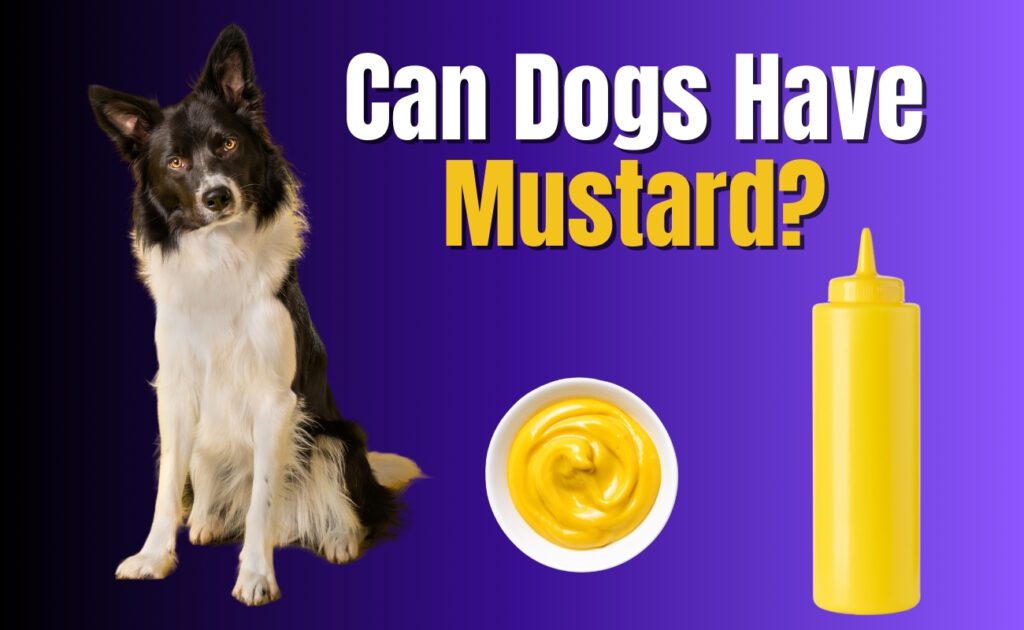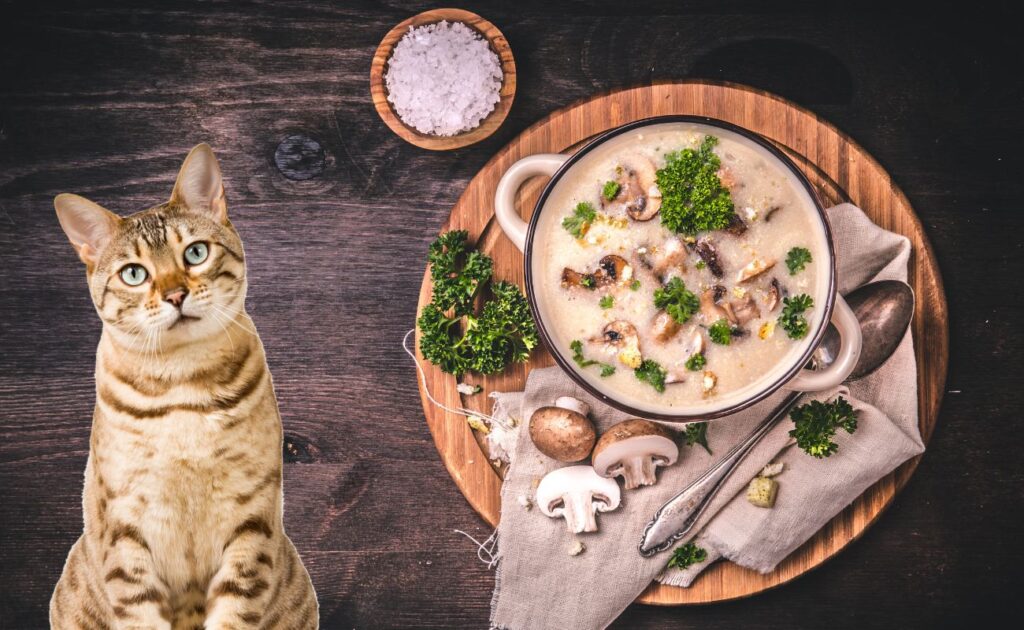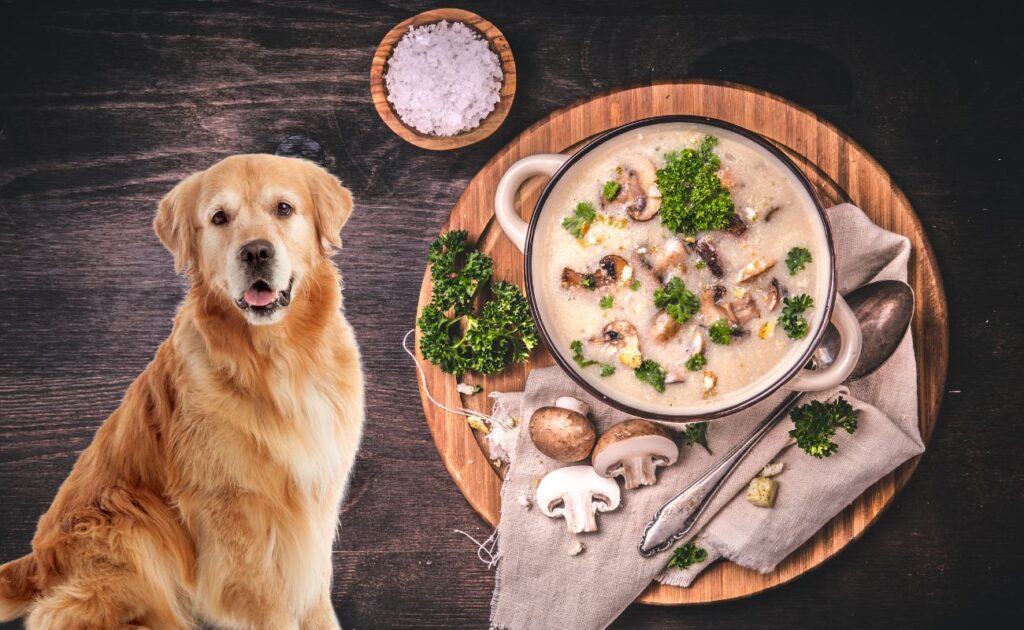Can Dogs Have Mustard? A Complete Guide for Dog Owners

Ever had a moment where your dog watches you intently while you’re eating something, hoping for a taste? Maybe you’ve seen those puppy eyes while squeezing mustard onto your hot dog. It’s tempting to share your food with your furry friend, but have you ever wondered if mustard is safe for dogs? In this article, we’ll explore whether dogs can have mustard and what you should do if your dog accidentally eats some. The truth might surprise you! What is Mustard? Before diving into whether dogs can eat mustard, let’s take a closer look at what mustard actually is. Mustard is a popular condiment made from the seeds of the mustard plant. It’s commonly used to add flavor to foods like sandwiches, hot dogs, and salad dressings. There are several types of mustard, including yellow mustard, Dijon mustard, and whole grain mustard. Each type has a slightly different flavor and is made using different ingredients. For example, yellow mustard is made with mustard seeds, vinegar, water, and turmeric, which gives it its bright yellow color. Dijon mustard, on the other hand, is a bit spicier and is made with white wine. Can Dogs Eat Mustard? So, can dogs eat mustard? The short answer is no. Mustard is not safe for dogs to eat. While a small lick of mustard may not cause immediate harm, it’s not something you should intentionally give your dog. Why is Mustard Dangerous for Dogs? The main reason mustard is unsafe for dogs is due to its ingredients. Mustard seeds, which are the key ingredient in mustard, contain compounds that can be harmful to dogs. These compounds can irritate a dog’s digestive system and lead to problems like vomiting and diarrhea. In some cases, mustard can even cause more serious issues. For example, large amounts of mustard seeds can lead to a condition called gastroenteritis, which is an inflammation of the stomach and intestines. This can be very uncomfortable for your dog and may require a visit to the vet. Additionally, many mustard products contain other ingredients like garlic, onions, or spices that are also harmful to dogs. These ingredients can be toxic to dogs and cause serious health problems. Safe Alternatives to Mustard Just because mustard isn’t safe for dogs doesn’t mean you can’t give your dog a tasty treat. There are plenty of dog-friendly alternatives that you can offer instead. Dog-Friendly Condiments While it’s best to avoid giving dogs most human condiments, there are a few that can be safe in small amounts. For example, plain, unsweetened yogurt can be a tasty and safe treat for dogs. It’s important to check that the yogurt doesn’t contain any artificial sweeteners like xylitol, which is toxic to dogs. Peanut Butter Another popular dog treat is peanut butter. Many dogs love the taste of peanut butter, and it’s generally safe for them to eat. Just make sure to choose a peanut butter that doesn’t contain xylitol or added sugar. Homemade Mustard-Flavored Treats If you want to give your dog something that mimics the flavor of mustard without the harmful ingredients, you can try making a homemade dog treat. Here’s a simple recipe: Ingredients: 1 cup of cooked, mashed pumpkin (pumpkin is safe for dogs and can be good for their digestion) 2 tablespoons of plain, unsweetened yogurt A small pinch of turmeric (for color and a mild flavor boost) Instructions: Mix all the ingredients together in a bowl until well combined. Spoon the mixture into small, bite-sized molds or onto a baking sheet lined with parchment paper. Freeze for a few hours until solid. Serve the treats to your dog as a special snack! These treats give your dog a fun, flavorful experience without any of the risks associated with real mustard. Conclusion To sum it up, mustard is not a safe food for dogs. The ingredients in mustard, particularly mustard seeds, can cause digestive problems and other health issues. If your dog accidentally eats mustard, it’s important to monitor them closely and contact your vet if you notice any symptoms. As a pet owner, it’s always a good idea to be cautious about what you feed your dog. While it can be tempting to share your food with your furry friend, some human foods are best left on your plate. Instead, stick to dog-friendly treats and foods that are safe for your dog to enjoy.
Can Cats Eat Cream of Mushroom Soup?

Understanding Cream of Mushroom Soup, Can Cats Eat Cream of Mushroom Soup? Cream of mushroom soup is a creamy and savory dish made from mushrooms, cream, broth, and various seasonings. It’s a staple in many households and is often used as a base for casseroles, sauces, and soups. As a cat owner, you’re likely familiar with the curiosity your feline friend displays toward your meals. Cream of mushroom soup is a comforting dish enjoyed by many, but can cats partake in this indulgence? In this comprehensive guide, we’ll delve into the question, “Can cats eat cream of mushroom soup?” to provide valuable insights into feline nutrition and safety considerations. Ingredients in Cream of Mushroom Soup Common ingredients in cream of mushroom soup include mushrooms cream water or broth butter flour (as a thickening agent) salt pepper sometimes onions or garlic for flavor Can Cats Digest Cream of Mushroom Soup? While cats can digest some dairy products in moderation, cream of mushroom soup may not be well-tolerated by all cats. Cats lack the necessary enzymes to digest lactose, the sugar found in dairy products, which can lead to gastrointestinal upset. Nutritional Value of Cream of Mushroom Soup Cream of mushroom soup is relatively high in fat and calories, primarily from the cream and butter content. It may provide some protein and vitamins from the mushrooms, but it’s not a balanced or complete meal for cats. Here’s a chart detailing the approximate nutritional value of cream of mushroom soup per 1-cup (240 mL) serving Nutrient Amount Per Serving Calories 200 Total Fat 12g Saturated Fat 6g Cholesterol 30mg Sodium 950mg Total Carbohydrates 20g Dietary Fiber 2g Sugars 5g Protein 5g Vitamin A 10% DV Vitamin C 0% DV Calcium 6% DV Iron 4% DV Please note that the values provided are approximate and may vary based on the specific recipe and brand of cream of mushroom soup. Additionally, the percent daily values (% DV) are based on a 2000-calorie diet and may vary depending on individual dietary needs. Always refer to the nutrition label for the most accurate information. Potential Risks of Feeding Cream of Mushroom Soup to Cats Feeding cream of mushroom soup to cats can pose several risks, including gastrointestinal upset, pancreatitis (inflammation of the pancreas), and obesity due to its high fat and calorie content. Additionally, some ingredients, such as onions or garlic, may be toxic to cats. Common Allergens in Cream of Mushroom Soup Cats can develop allergies or sensitivities to certain ingredients in cream of mushroom soup, such as dairy, onions, or garlic. Allergic reactions may manifest as Itching Skin rashes Ear infections Digestive issues Safe Alternatives for Cat Treats Instead of feeding cream of mushroom soup to your cat, consider offering them safe and nutritious alternatives, such as commercially available cat treats made from wholesome ingredients. Look for treats specifically formulated for feline consumption to ensure they meet your cat’s nutritional needs. Introducing New Foods into Your Cat’s Diet When introducing new foods into your cat’s diet, do so gradually and in small quantities to monitor their reaction. Watch for any signs of digestive upset or allergic reactions, and consult with your veterinarian if you have concerns about your cat’s diet or health. Signs of Digestive Upset in Cats Common signs of digestive upset in cats include vomiting, diarrhea, abdominal pain, lethargy, decreased appetite, and changes in stool quality or frequency. If your cat experiences any of these symptoms after consuming cream of mushroom soup, withhold further food and water and contact your veterinarian for guidance. What to Do If Your Cat Eats Cream of Mushroom Soup If your cat consumes cream of mushroom soup accidentally, monitor them closely for any signs of illness or discomfort. Offer plenty of fresh water to help dilute any potential toxins and contact your veterinarian for further advice. Summary Can Cats Eat Cream of Mushroom Soup? Prioritizing Your Cat’s Health and Well-being While the cream of mushroom soup may be a tasty treat for humans, it’s not suitable for cats due to its high-fat, calorie, and potentially toxic ingredient content. As a responsible pet owner, it’s essential to prioritize your cat’s health and well-being by providing them with a balanced and nutritious diet tailored to their specific needs. When in doubt, consult with your veterinarian for personalized dietary recommendations and guidance. Remember, keeping your cat healthy and happy is the ultimate goal.
Can Dogs Eat Cream of Mushroom Soup?

What is Cream of Mushroom Soup Can Dogs Eat Cream of Mushroom Soup Cream of mushroom soup is a popular dish made from mushrooms, cream, and various seasonings. It is often used as a base for casseroles, sauces, and soups, known for its rich and savory flavor. As a responsible pet owner, it’s natural to wonder about the safety of sharing human foods with your furry friend. Cream of mushroom soup is a comforting dish enjoyed by many, but can dogs partake in this indulgence? In this comprehensive guide, we’ll delve into the question, “Can dogs eat cream of mushroom soup?” to provide you with valuable insights into canine nutrition and safety considerations. Ingredients in Cream of Mushroom Soup Common ingredients in cream of mushroom soup include Mushrooms Cream Water or broth Flour Butter Salt Pepper Other seasonings or additives. Can Dogs Digest Cream of Mushroom Soup? While dogs have evolved to digest a variety of foods, including some dairy products, cream of mushroom soup may not be well-tolerated by all dogs. Dogs lack the necessary enzymes to digest lactose, the sugar found in dairy products, which can lead to gastrointestinal upset. Nutritional Value of Cream of Mushroom Soup Cream of mushroom soup is relatively high in fat and calories, primarily from the cream and butter content. While it may provide some protein and vitamins from the mushrooms, it is not a balanced or complete meal for dogs. Here’s a chart detailing the approximate nutritional value of cream of mushroom soup per 1-cup (240 mL) serving Nutrient Amount Per Serving Calories 200 Total Fat 12g Saturated Fat 6g Cholesterol 30mg Sodium 950mg Total Carbohydrates 20g Dietary Fiber 2g Sugars 5g Protein 5g Vitamin A 10% DV Vitamin C 0% DV Calcium 6% DV Iron 4% DV Please note that the values provided are approximate and may vary based on the specific recipe and brand of cream of mushroom soup. Additionally, the percent daily values (% DV) are based on a 2000-calorie diet and may vary depending on individual dietary needs. Always refer to the nutrition label for the most accurate information. Potential Risks of Feeding Cream of Mushroom Soup to Dogs Feeding cream of mushroom soup to dogs can pose several risks, including gastrointestinal upset, pancreatitis (inflammation of the pancreas), and obesity due to its high fat and calorie content. Additionally, some ingredients in cream of mushroom soup, such as onions or garlic, may be toxic to dogs. Common Allergens in Cream of Mushroom Soup Dogs can develop allergies or sensitivities to certain ingredients in cream of mushroom soup, such as dairy, wheat (if flour is used as a thickener), or specific seasonings. Allergic reactions may manifest as Itching Skin rashes Ear infections Digestive issues. Safe Alternatives for Dog Treats Instead of feeding cream of mushroom soup to your dog, consider offering them safe and nutritious alternatives, such as commercially available dog treats made from wholesome ingredients. Look for treats specifically formulated for canine consumption to ensure they meet your dog’s nutritional needs. Introducing New Foods into Your Dog’s Diet When introducing new foods into your dog’s diet, do so gradually and in small quantities to monitor their reaction. Watch for any signs of digestive upset or allergic reactions, and consult with your veterinarian if you have concerns about your dog’s diet or health. Signs of Digestive Upset in Dogs Common signs of digestive upset in dogs include vomiting, diarrhea, abdominal pain, lethargy, decreased appetite, and changes in stool quality or frequency. If your dog experiences any of these symptoms after consuming cream of mushroom soup, withhold further food and water and contact your veterinarian for guidance. What to Do If Your Dog Eats Cream of Mushroom Soup If your dog consumes cream of mushroom soup accidentally, monitor them closely for any signs of illness or discomfort. Offer plenty of fresh water to help dilute any potential toxins and contact your veterinarian for further advice. Summary, Can Dogs Eat Cream of Mushroom Soup? Prioritizing Your Dog’s Health and Well-being While the cream of mushroom soup may be a tasty treat for humans, it is not suitable for dogs due to its high-fat, calorie, and potentially toxic ingredient content. As a responsible pet owner, it’s essential to prioritize your dog’s health and well-being by providing them with a balanced and nutritious diet tailored to their specific needs. When in doubt, consult with your veterinarian for personalized dietary recommendations and guidance. Remember, keeping your dog healthy and happy is the ultimate goal.

